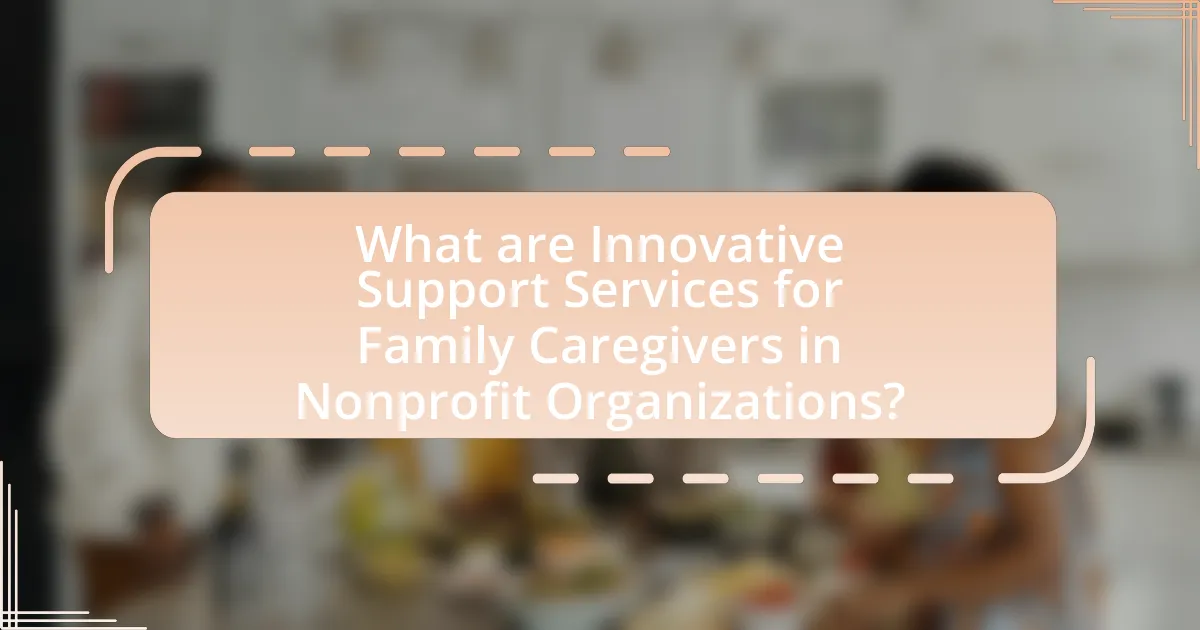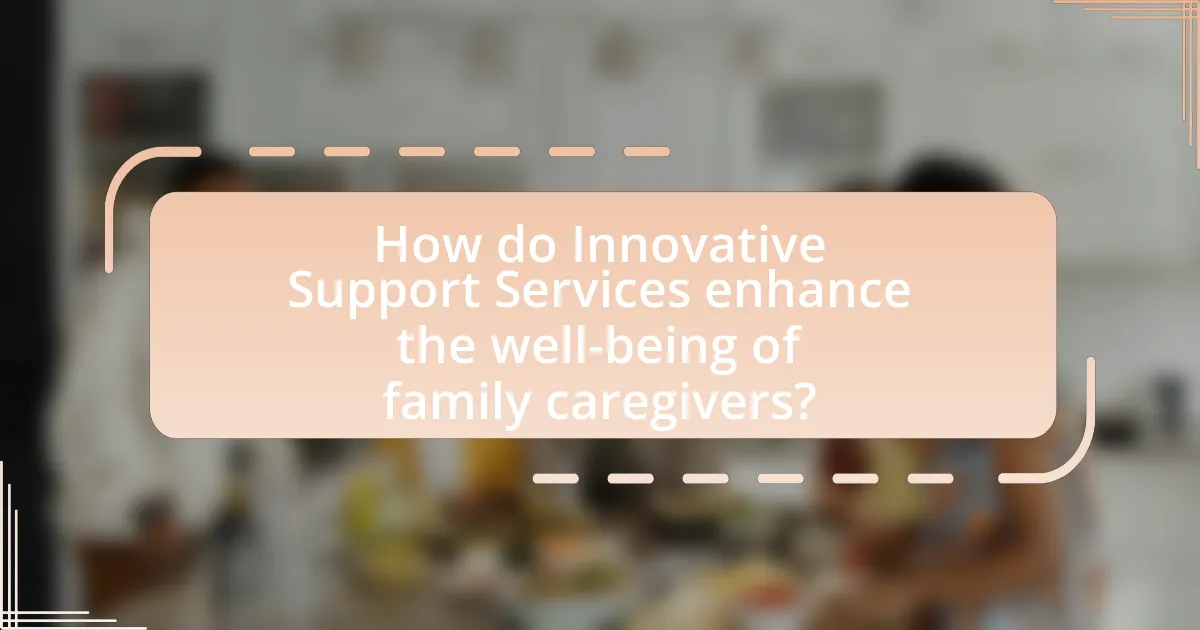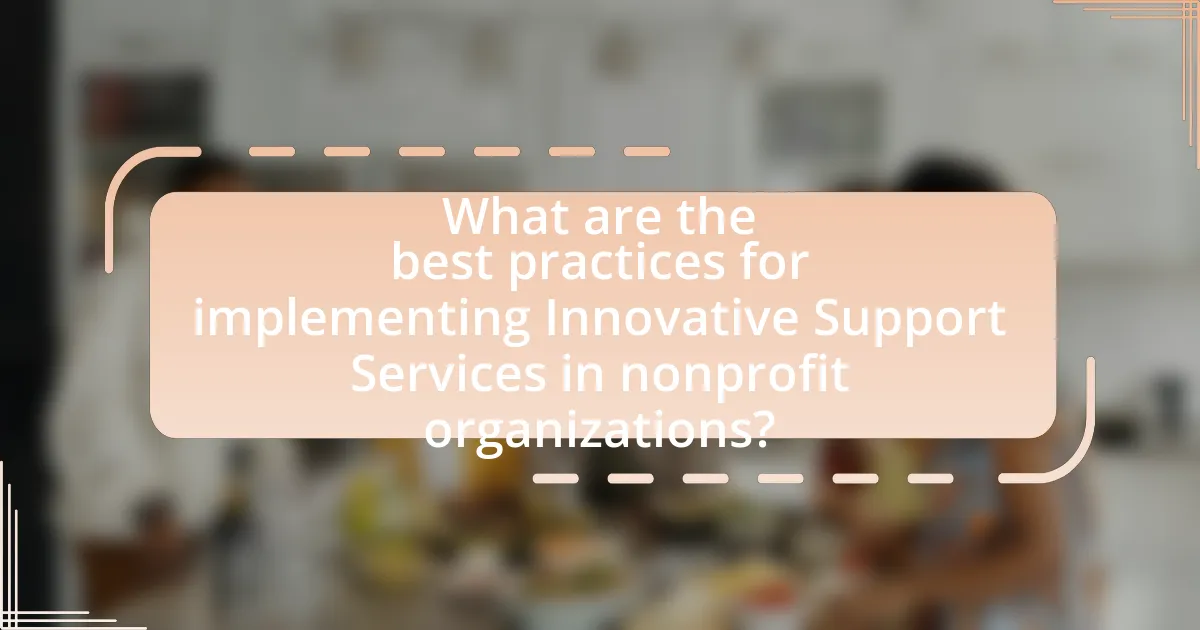Innovative support services for family caregivers in nonprofit organizations encompass a range of resources designed to alleviate the physical and emotional burdens faced by caregivers. Key services include respite care, counseling, educational workshops, and peer support groups, all aimed at enhancing caregiver well-being and reducing stress. The article explores the specific challenges caregivers encounter, such as emotional strain and financial burdens, and highlights how these innovative services address those needs effectively. Additionally, it discusses the critical role of nonprofit organizations in providing tailored support, the differences between nonprofit and for-profit entities in caregiver assistance, and best practices for implementing these services. Evidence supporting the effectiveness of these services in improving caregiver satisfaction and mental health is also presented, underscoring their importance in the caregiving ecosystem.

What are Innovative Support Services for Family Caregivers in Nonprofit Organizations?
Innovative support services for family caregivers in nonprofit organizations include respite care, counseling, educational workshops, and peer support groups. These services aim to alleviate the physical and emotional burden on caregivers, enhancing their well-being and ability to provide care. For instance, respite care allows caregivers temporary relief by providing professional care for their loved ones, which has been shown to reduce caregiver stress and improve overall family dynamics. Additionally, educational workshops equip caregivers with essential skills and knowledge, while peer support groups foster community and shared experiences, contributing to emotional resilience. Research indicates that such services significantly improve caregiver satisfaction and reduce feelings of isolation, validating their importance in nonprofit support frameworks.
How do these services address the needs of family caregivers?
Innovative support services for family caregivers in nonprofit organizations address their needs by providing essential resources, respite care, and emotional support. These services help alleviate the physical and emotional burden caregivers experience, as studies indicate that caregivers often face high levels of stress and burnout. For instance, a report by the National Alliance for Caregiving found that 61% of family caregivers feel overwhelmed by the demands of caregiving. By offering training, counseling, and community support, these organizations empower caregivers with skills and knowledge, enhancing their ability to provide care while also prioritizing their own well-being.
What specific challenges do family caregivers face?
Family caregivers face numerous specific challenges, including emotional stress, physical strain, financial burden, and lack of support. Emotional stress arises from the constant responsibility of caregiving, which can lead to anxiety and depression; studies indicate that up to 40% of family caregivers experience significant emotional distress. Physical strain is common due to the demanding nature of caregiving tasks, often resulting in health issues for the caregiver themselves. Financial burden is another critical challenge, as caregivers frequently incur out-of-pocket expenses for medical care and support services, with estimates suggesting that caregivers spend an average of $7,000 annually on caregiving-related costs. Lastly, lack of support from healthcare systems and social networks exacerbates these challenges, leaving caregivers feeling isolated and overwhelmed.
How do innovative services provide solutions to these challenges?
Innovative services provide solutions to the challenges faced by family caregivers in nonprofit organizations by offering tailored support, resources, and technology that enhance caregiving efficiency and reduce stress. For instance, services such as online training programs equip caregivers with essential skills, while digital platforms facilitate communication and coordination among caregivers and healthcare providers. Research indicates that 70% of caregivers report feeling overwhelmed, and innovative services that include respite care and peer support groups have been shown to significantly alleviate this burden, improving overall caregiver well-being and satisfaction.
Why are nonprofit organizations crucial in supporting family caregivers?
Nonprofit organizations are crucial in supporting family caregivers because they provide essential resources, education, and emotional support tailored to the unique challenges caregivers face. These organizations often offer training programs, respite care services, and access to support groups, which help alleviate caregiver stress and improve their well-being. For instance, a study by the National Alliance for Caregiving found that 61% of family caregivers reported feeling overwhelmed, highlighting the need for structured support systems. Nonprofits play a vital role in bridging gaps in healthcare and social services, ensuring caregivers receive the assistance necessary to manage their responsibilities effectively.
What role do nonprofits play in the caregiving ecosystem?
Nonprofits play a crucial role in the caregiving ecosystem by providing essential support services to family caregivers. These organizations offer resources such as training, respite care, and emotional support, which are vital for caregivers managing the demands of caring for loved ones. For instance, a study by the National Alliance for Caregiving found that 61% of family caregivers reported feeling overwhelmed, highlighting the need for the assistance that nonprofits can provide. Additionally, nonprofits often advocate for policy changes that benefit caregivers, ensuring their needs are recognized at local and national levels. This multifaceted support not only alleviates caregiver stress but also enhances the overall quality of care provided to individuals in need.
How do nonprofit organizations differ from for-profit entities in caregiver support?
Nonprofit organizations differ from for-profit entities in caregiver support primarily by their mission-driven focus on community welfare rather than profit generation. Nonprofits typically provide services such as counseling, respite care, and educational resources at little to no cost, funded through donations and grants, which allows them to prioritize caregiver needs over financial gain. In contrast, for-profit entities often charge for services and may prioritize profitability, potentially limiting access to support for caregivers. For example, a study by the National Alliance for Caregiving found that nonprofit organizations are more likely to offer free support groups and workshops, which directly addresses the financial barriers caregivers face.
What types of innovative support services are available?
Innovative support services available for family caregivers in nonprofit organizations include respite care, technology-based support, peer support groups, and educational workshops. Respite care provides temporary relief for caregivers, allowing them to take breaks while ensuring their loved ones receive care. Technology-based support, such as telehealth services and caregiver apps, enhances communication and access to resources. Peer support groups foster community and shared experiences among caregivers, promoting emotional well-being. Educational workshops equip caregivers with essential skills and knowledge to manage caregiving challenges effectively. These services are designed to alleviate caregiver stress and improve the quality of care provided.
What are the most common types of support services offered?
The most common types of support services offered to family caregivers in nonprofit organizations include respite care, counseling, support groups, educational resources, and financial assistance. Respite care provides temporary relief for caregivers, allowing them to take breaks while ensuring their loved ones receive care. Counseling services offer emotional support and coping strategies for the challenges caregivers face. Support groups facilitate peer connections, enabling caregivers to share experiences and advice. Educational resources equip caregivers with knowledge about caregiving techniques and available services. Financial assistance helps alleviate the economic burden associated with caregiving responsibilities. These services are essential for enhancing the well-being of caregivers and improving the quality of care for those they support.
How do these services vary by organization or region?
Services for family caregivers in nonprofit organizations vary significantly by organization and region due to differences in funding, community needs, and available resources. For instance, urban organizations may offer more comprehensive services, such as respite care and counseling, compared to rural organizations that might focus on basic support due to limited funding and fewer volunteers. Additionally, regional cultural attitudes towards caregiving can influence the types of services provided; for example, some regions may prioritize mental health support while others may emphasize practical assistance. Studies show that organizations in areas with higher population density often have access to more diverse funding sources, enabling them to implement a wider range of innovative support services.

How do Innovative Support Services enhance the well-being of family caregivers?
Innovative Support Services enhance the well-being of family caregivers by providing tailored resources, emotional support, and practical assistance that reduce stress and improve their quality of life. These services often include respite care, counseling, and educational programs that equip caregivers with essential skills and knowledge. Research indicates that caregivers who utilize such services report lower levels of anxiety and depression, as well as increased feelings of social support and satisfaction. For instance, a study published in the Journal of Family Psychology found that caregivers who engaged with support services experienced a 30% reduction in caregiver burden, demonstrating the significant impact these services have on their overall well-being.
What impact do these services have on caregiver stress levels?
Innovative support services for family caregivers significantly reduce caregiver stress levels. These services, such as respite care, counseling, and educational programs, provide caregivers with essential breaks, emotional support, and practical skills. Research indicates that caregivers who utilize these services report lower levels of anxiety and depression, as well as improved overall well-being. For instance, a study published in the Journal of Gerontological Social Work found that caregivers who participated in respite care programs experienced a 30% reduction in stress levels compared to those who did not. This evidence underscores the positive impact of such services on alleviating caregiver stress.
How do support services contribute to mental health improvements?
Support services contribute to mental health improvements by providing essential resources, emotional support, and practical assistance to individuals facing mental health challenges. These services, such as counseling, peer support groups, and educational programs, help reduce feelings of isolation and stress, which are critical factors in mental health. Research indicates that access to support services can lead to a 30% reduction in depressive symptoms among participants, demonstrating their effectiveness in enhancing mental well-being. Furthermore, support services empower individuals by equipping them with coping strategies and resilience-building techniques, fostering a sense of control over their mental health.
What evidence exists to support the effectiveness of these services?
Evidence supporting the effectiveness of innovative support services for family caregivers in nonprofit organizations includes various studies demonstrating improved caregiver well-being and reduced stress levels. For instance, a study published in the Journal of Gerontological Social Work found that caregivers who participated in structured support programs reported a 30% decrease in caregiver burden and a significant increase in emotional well-being. Additionally, the National Alliance for Caregiving reported that caregivers utilizing these services experienced enhanced coping strategies and better access to resources, leading to improved overall health outcomes. These findings indicate that such services are effective in addressing the needs of family caregivers.
How do family caregivers benefit from community engagement through nonprofits?
Family caregivers benefit from community engagement through nonprofits by gaining access to resources, support networks, and educational opportunities that enhance their caregiving experience. Nonprofits often provide workshops, training sessions, and peer support groups, which help caregivers develop skills and reduce feelings of isolation. For instance, a study by the Family Caregiver Alliance found that caregivers who participated in community programs reported improved emotional well-being and reduced stress levels. Additionally, nonprofits can connect caregivers with financial assistance and respite care services, further alleviating the burdens associated with caregiving.
What opportunities for social interaction do these services provide?
Innovative support services for family caregivers in nonprofit organizations provide opportunities for social interaction through peer support groups, workshops, and community events. These services facilitate connections among caregivers, allowing them to share experiences, offer emotional support, and exchange practical advice. Research indicates that participation in peer support groups can significantly reduce feelings of isolation and improve mental well-being among caregivers, as evidenced by a study published in the Journal of Family Psychology, which found that caregivers who engaged in social support networks reported higher levels of satisfaction and lower levels of stress.
How does community support enhance caregiver resilience?
Community support enhances caregiver resilience by providing emotional, informational, and practical resources that reduce stress and prevent burnout. Caregivers who engage with supportive networks experience increased feelings of belonging and validation, which are crucial for mental well-being. Research indicates that caregivers with access to community resources report lower levels of anxiety and depression, as well as improved coping strategies. For instance, a study published in the Journal of Family Psychology found that caregivers who participated in support groups experienced a significant increase in resilience scores compared to those who did not. This demonstrates that community support not only fosters emotional strength but also equips caregivers with the tools necessary to manage their responsibilities effectively.

What are the best practices for implementing Innovative Support Services in nonprofit organizations?
The best practices for implementing Innovative Support Services in nonprofit organizations include conducting thorough needs assessments, engaging stakeholders, and utilizing technology effectively. Conducting needs assessments allows organizations to identify specific gaps in support for family caregivers, ensuring that services are tailored to their unique challenges. Engaging stakeholders, including caregivers themselves, helps to create programs that are relevant and effective, fostering a sense of community and ownership. Utilizing technology, such as online platforms for resource sharing and virtual support groups, enhances accessibility and can reach a broader audience. These practices are supported by research indicating that tailored services significantly improve caregiver satisfaction and outcomes, as highlighted in studies by the Family Caregiver Alliance.
How can nonprofits effectively assess the needs of family caregivers?
Nonprofits can effectively assess the needs of family caregivers by conducting comprehensive surveys and focus groups that gather qualitative and quantitative data on their experiences and challenges. Research indicates that 60% of family caregivers report feeling overwhelmed, highlighting the necessity for targeted support services. By analyzing this data, nonprofits can identify specific areas where caregivers require assistance, such as respite care, financial support, or emotional counseling. Additionally, collaborating with healthcare providers and community organizations can enhance the understanding of caregiver needs, ensuring that services are tailored to address the most pressing issues faced by this demographic.
What methods can be used to gather feedback from caregivers?
Surveys and interviews are effective methods to gather feedback from caregivers. Surveys can be distributed online or in paper format, allowing caregivers to provide their insights anonymously and at their convenience. Interviews, whether conducted in person or via phone, enable deeper conversations and a more nuanced understanding of caregivers’ experiences and needs. Research indicates that structured feedback mechanisms, such as these, can lead to improved support services tailored to caregivers’ specific challenges, enhancing overall service effectiveness in nonprofit organizations.
How can data inform the development of support services?
Data can inform the development of support services by identifying the specific needs and challenges faced by family caregivers. For instance, surveys and analytics can reveal common stressors, such as time constraints and emotional burdens, allowing organizations to tailor their services accordingly. Research from the National Alliance for Caregiving indicates that 61% of caregivers report feeling overwhelmed, highlighting the necessity for targeted interventions. By analyzing demographic data, organizations can also ensure that support services are accessible and relevant to diverse caregiver populations, ultimately enhancing service effectiveness and satisfaction.
What strategies can nonprofits employ to promote their support services?
Nonprofits can employ targeted outreach, social media engagement, and community partnerships to promote their support services. Targeted outreach involves identifying specific demographics that would benefit from the services and directly communicating with them through tailored messaging. Social media engagement allows nonprofits to share success stories, service information, and resources, reaching a broader audience effectively; for instance, 73% of adults use social media, making it a powerful tool for engagement. Community partnerships with local organizations can enhance visibility and credibility, as collaboration often leads to shared resources and increased trust within the community. These strategies collectively enhance awareness and utilization of support services offered by nonprofits.
How can outreach efforts be tailored to reach diverse caregiver populations?
Outreach efforts can be tailored to reach diverse caregiver populations by employing culturally relevant communication strategies and utilizing community partnerships. Research indicates that caregivers from different backgrounds respond better to outreach that reflects their cultural values and languages, which enhances engagement and trust. For example, a study published in the Journal of Family Issues found that targeted messaging in caregivers’ native languages significantly increased participation rates in support programs. Additionally, collaborating with local organizations that serve specific demographic groups can help identify unique needs and preferences, ensuring that outreach is both effective and inclusive.
What role does technology play in promoting these services?
Technology plays a crucial role in promoting innovative support services for family caregivers in nonprofit organizations by enhancing communication, accessibility, and resource management. For instance, digital platforms enable caregivers to connect with support networks and access information quickly, which is vital for their well-being. Research indicates that 70% of caregivers report improved access to resources through mobile applications and online forums, demonstrating technology’s effectiveness in facilitating support. Additionally, data management systems streamline service delivery, allowing organizations to track caregiver needs and tailor services accordingly, ultimately improving the overall support experience.
What are practical tips for family caregivers to utilize these support services effectively?
Family caregivers can effectively utilize support services by first identifying their specific needs and matching them with available resources. This involves researching local nonprofit organizations that offer tailored programs, such as respite care, counseling, and educational workshops. Engaging with these organizations can provide caregivers with essential tools and information, enhancing their caregiving skills and reducing stress. Additionally, establishing a regular communication channel with support service providers ensures caregivers stay informed about new resources and updates. Studies show that caregivers who actively participate in support programs report lower levels of stress and improved well-being, highlighting the importance of utilizing these services effectively.